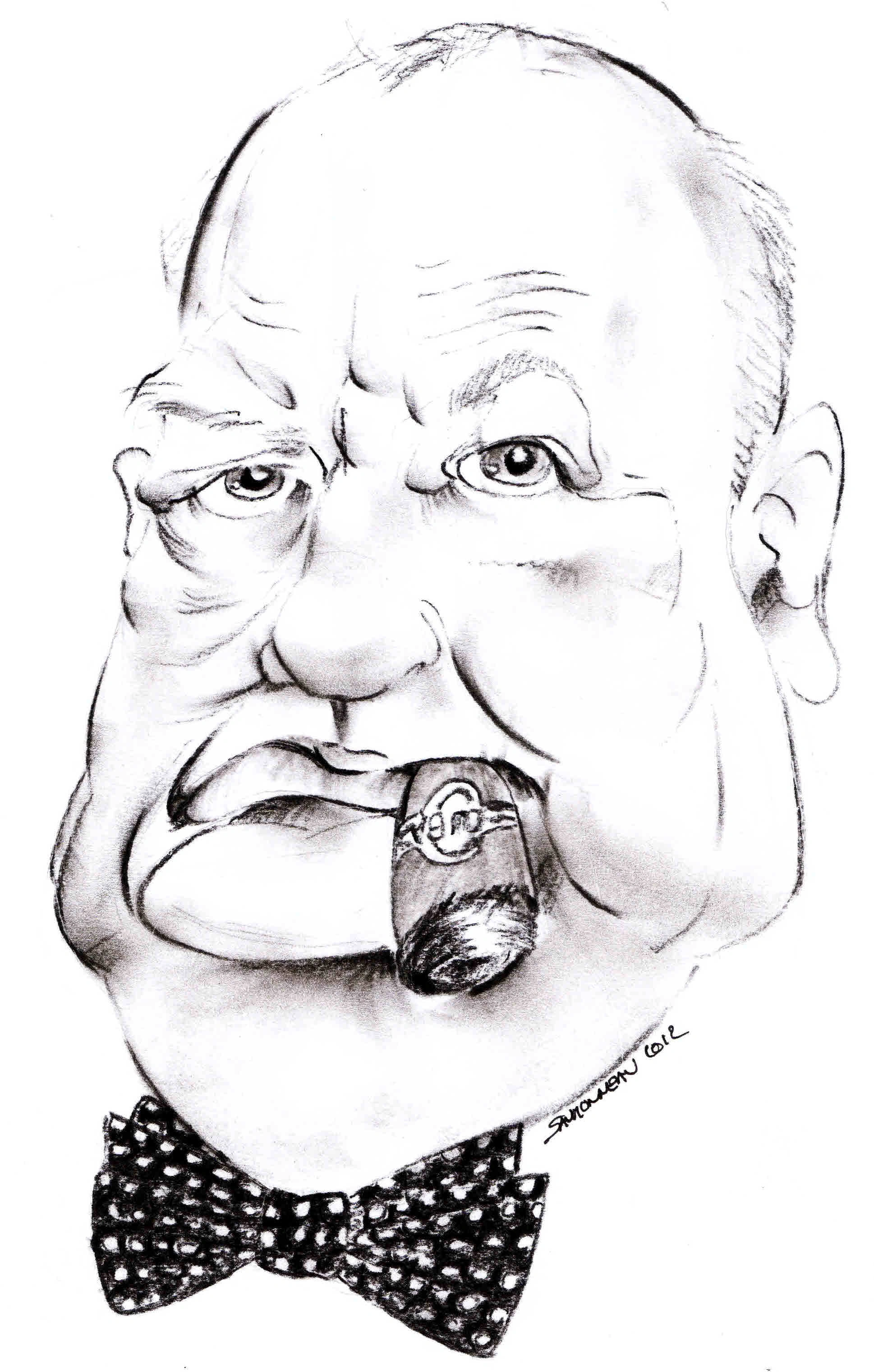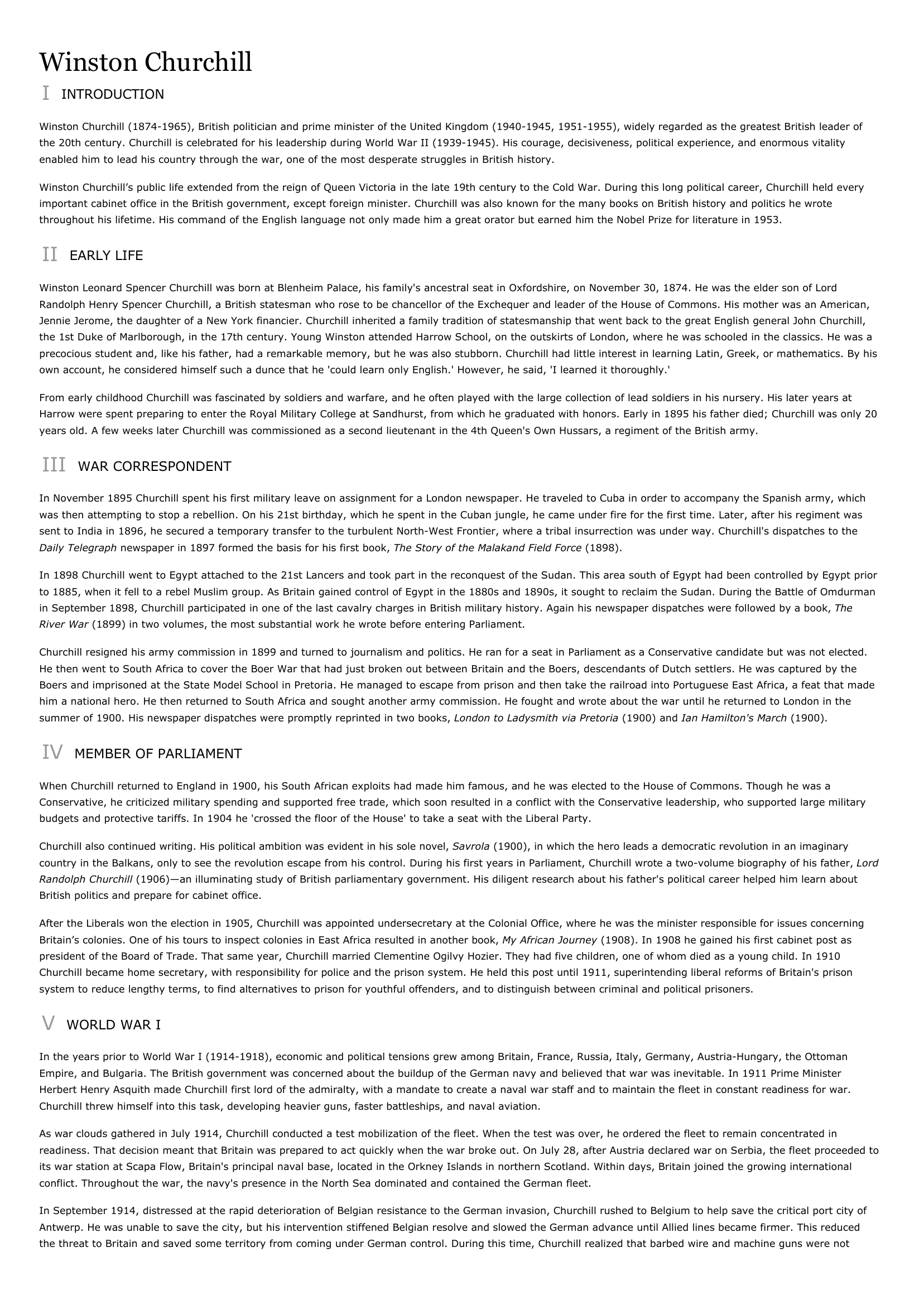Churchill (Sir Winston)
Publié le 10/07/2019

Extrait du document

Malgré le prestige international dont jouit Churchill, les graves difficultés économiques et sociales de son pays coûtent à son parti les élections à la chambre des Communes en 1945, et l'obligent à démissionner pendant la conférence de Postdam. De nouveau Premier ministre et chef du parti conservateur en 1951, le \"vieux lion\" renonce au pouvoir en 1955, et consacre les dernières années de sa vie à poursuivre une vaste oeuvre historique et littéraire, déjà récompensée en 1953 par le prix Nobel de littérature (\"La Crise mondiale\", 1923-1929 ; \"Mes Aventures de jeunesse\", traduit en français en 1937 ; \"Les Grands Contemporains\", traduit en 1939 ; \"Mémoires sur la Seconde Guerre mondiale\", 1948-1954).

«
Winston Churchill
I INTRODUCTION
Winston Churchill (1874-1965), British politician and prime minister of the United Kingdom (1940-1945, 1951-1955), widely regarded as the greatest British leader of the 20th century.
Churchill is celebrated for his leadership during World War II (1939-1945).
His courage, decisiveness, political experience, and enormous vitalityenabled him to lead his country through the war, one of the most desperate struggles in British history.
Winston Churchill’s public life extended from the reign of Queen Victoria in the late 19th century to the Cold War.
During this long political career, Churchill held everyimportant cabinet office in the British government, except foreign minister.
Churchill was also known for the many books on British history and politics he wrotethroughout his lifetime.
His command of the English language not only made him a great orator but earned him the Nobel Prize for literature in 1953.
II EARLY LIFE
Winston Leonard Spencer Churchill was born at Blenheim Palace, his family's ancestral seat in Oxfordshire, on November 30, 1874.
He was the elder son of LordRandolph Henry Spencer Churchill, a British statesman who rose to be chancellor of the Exchequer and leader of the House of Commons.
His mother was an American,Jennie Jerome, the daughter of a New York financier.
Churchill inherited a family tradition of statesmanship that went back to the great English general John Churchill,the 1st Duke of Marlborough, in the 17th century.
Young Winston attended Harrow School, on the outskirts of London, where he was schooled in the classics.
He was aprecocious student and, like his father, had a remarkable memory, but he was also stubborn.
Churchill had little interest in learning Latin, Greek, or mathematics.
By hisown account, he considered himself such a dunce that he 'could learn only English.' However, he said, 'I learned it thoroughly.'
From early childhood Churchill was fascinated by soldiers and warfare, and he often played with the large collection of lead soldiers in his nursery.
His later years atHarrow were spent preparing to enter the Royal Military College at Sandhurst, from which he graduated with honors.
Early in 1895 his father died; Churchill was only 20years old.
A few weeks later Churchill was commissioned as a second lieutenant in the 4th Queen's Own Hussars, a regiment of the British army.
III WAR CORRESPONDENT
In November 1895 Churchill spent his first military leave on assignment for a London newspaper.
He traveled to Cuba in order to accompany the Spanish army, whichwas then attempting to stop a rebellion.
On his 21st birthday, which he spent in the Cuban jungle, he came under fire for the first time.
Later, after his regiment wassent to India in 1896, he secured a temporary transfer to the turbulent North-West Frontier, where a tribal insurrection was under way.
Churchill's dispatches to theDaily Telegraph newspaper in 1897 formed the basis for his first book, The Story of the Malakand Field Force (1898).
In 1898 Churchill went to Egypt attached to the 21st Lancers and took part in the reconquest of the Sudan.
This area south of Egypt had been controlled by Egypt priorto 1885, when it fell to a rebel Muslim group.
As Britain gained control of Egypt in the 1880s and 1890s, it sought to reclaim the Sudan.
During the Battle of Omdurmanin September 1898, Churchill participated in one of the last cavalry charges in British military history.
Again his newspaper dispatches were followed by a book, The River War (1899) in two volumes, the most substantial work he wrote before entering Parliament.
Churchill resigned his army commission in 1899 and turned to journalism and politics.
He ran for a seat in Parliament as a Conservative candidate but was not elected.He then went to South Africa to cover the Boer War that had just broken out between Britain and the Boers, descendants of Dutch settlers.
He was captured by theBoers and imprisoned at the State Model School in Pretoria.
He managed to escape from prison and then take the railroad into Portuguese East Africa, a feat that madehim a national hero.
He then returned to South Africa and sought another army commission.
He fought and wrote about the war until he returned to London in thesummer of 1900.
His newspaper dispatches were promptly reprinted in two books, London to Ladysmith via Pretoria (1900) and Ian Hamilton's March (1900).
IV MEMBER OF PARLIAMENT
When Churchill returned to England in 1900, his South African exploits had made him famous, and he was elected to the House of Commons.
Though he was aConservative, he criticized military spending and supported free trade, which soon resulted in a conflict with the Conservative leadership, who supported large militarybudgets and protective tariffs.
In 1904 he 'crossed the floor of the House' to take a seat with the Liberal Party.
Churchill also continued writing.
His political ambition was evident in his sole novel, Savrola (1900), in which the hero leads a democratic revolution in an imaginary country in the Balkans, only to see the revolution escape from his control.
During his first years in Parliament, Churchill wrote a two-volume biography of his father, Lord Randolph Churchill (1906)—an illuminating study of British parliamentary government.
His diligent research about his father's political career helped him learn about British politics and prepare for cabinet office.
After the Liberals won the election in 1905, Churchill was appointed undersecretary at the Colonial Office, where he was the minister responsible for issues concerningBritain’s colonies.
One of his tours to inspect colonies in East Africa resulted in another book, My African Journey (1908).
In 1908 he gained his first cabinet post as president of the Board of Trade.
That same year, Churchill married Clementine Ogilvy Hozier.
They had five children, one of whom died as a young child.
In 1910Churchill became home secretary, with responsibility for police and the prison system.
He held this post until 1911, superintending liberal reforms of Britain's prisonsystem to reduce lengthy terms, to find alternatives to prison for youthful offenders, and to distinguish between criminal and political prisoners.
V WORLD WAR I
In the years prior to World War I (1914-1918), economic and political tensions grew among Britain, France, Russia, Italy, Germany, Austria-Hungary, the OttomanEmpire, and Bulgaria.
The British government was concerned about the buildup of the German navy and believed that war was inevitable.
In 1911 Prime MinisterHerbert Henry Asquith made Churchill first lord of the admiralty, with a mandate to create a naval war staff and to maintain the fleet in constant readiness for war.Churchill threw himself into this task, developing heavier guns, faster battleships, and naval aviation.
As war clouds gathered in July 1914, Churchill conducted a test mobilization of the fleet.
When the test was over, he ordered the fleet to remain concentrated inreadiness.
That decision meant that Britain was prepared to act quickly when the war broke out.
On July 28, after Austria declared war on Serbia, the fleet proceeded toits war station at Scapa Flow, Britain's principal naval base, located in the Orkney Islands in northern Scotland.
Within days, Britain joined the growing internationalconflict.
Throughout the war, the navy's presence in the North Sea dominated and contained the German fleet.
In September 1914, distressed at the rapid deterioration of Belgian resistance to the German invasion, Churchill rushed to Belgium to help save the critical port city ofAntwerp.
He was unable to save the city, but his intervention stiffened Belgian resolve and slowed the German advance until Allied lines became firmer.
This reducedthe threat to Britain and saved some territory from coming under German control.
During this time, Churchill realized that barbed wire and machine guns were not.
»
↓↓↓ APERÇU DU DOCUMENT ↓↓↓
Liens utiles
- Sir Winston Churchill - Geschichte.
- Churchill (sir Winston), 1874-1965, né à Blenheim Palace (Oxfordshire), homme d'État britannique.
- Sir Winston Leonard Spencer Churchill - biography.
- Churchill (Sir Winston)
- Sir Winston CHURCHILL




